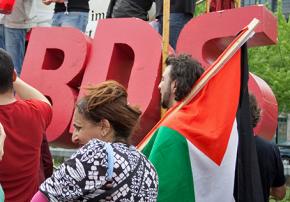BDS lays the basis for a real peace process
explains why it's important that the BDS movement's demands go beyond ending Israel's 1967 occupation, in an article published at Mondoweiss.
THE RECENT collapse of the "Kerry Plan" to revive the two-state solution has once again exposed the "peace process" as a cynical travesty, devoid of justice.
Recycled in various permutations for over two decades, the U.S. sponsored two-state solution has had a consistent purpose: force Palestinians to formally accept an apartheid "Jewish state" on more than three-quarters of historic Palestine and--at best--an Israeli-controlled Palestinian Bantusan on what's left.
It also demands that 7 million Palestinian refugees, transformed through Zionist alchemy from victims of ethnic cleansing into a collective threat to Israel's "Jewish character," permanently concede their right of return.
To succeed, this process requires an indigenous accomplice willing to trade away Palestinian rights and demobilize popular opposition in exchange for what Palestinian grassroots activist Haidar Eid describes as "a flag, a national anthem and a small piece of land on which to exercise municipal sovereignty and establish ministries, all with the permission of the occupier."

The Palestinian Authority (PA) was created by the 1993 Oslo Accords precisely to fulfill this function, to be administered by a compliant PLO "negotiating partner."
For iconic Palestinian intellectual and one-time senior PLO adviser Edward Said, this "instrument of Palestinian surrender, a Palestinian Versailles," was a catastrophe. "I doubt that there was a single Palestinian who watched the White House [signing] ceremony," he wrote, "who did not also feel that a century of sacrifice, dispossession and heroic struggle had finally come to nought."
Today's PA leadership under notional _resident Mahmoud Abbas represents a Palestinian neoliberal 1 Percent and actively colludes with Israeli forces to suppress any signs of resistance, having become, as Said predicted, "Israel's enforcer." Abbas has unashamedly affirmed this role, recently declaring the PA's "security relationship" with Israel "sacred."
Yet despite its best efforts at collaboration, the PA cannot openly submit to Israeli demands for total Palestinian capitulation, for fear of being toppled by a new popular Intifada.
FOR ITS part, the Obama administration regards a two-state solution as the best long-term means of securing Israel's ongoing role as watchdog for U.S. imperial interests in the region (Secretary of State Alexander Haig once referred to Israel as "the largest American aircraft carrier in the world").
As in all alliances, however, there is tension. Israel's highly conspicuous "Jewish-only" settlements in the 1967 territories undermine the U.S. administration's two-state plans as made clear by John Kerry's "poof" comment regarding Israel's responsibility for the most recent breakdown in the talks. At the same time, U.S. politicians know they must placate domestic pro-Israel forces or suffer the electoral consequences.
These strains notwithstanding, shared aims and ideology--rather than the "Israel lobby"--ultimately guarantee unconditional U.S. support for Israel, which is therefore free to drag out endless negotiations to nowhere.
The 2005 Palestinian call for Boycott, Divestment and Sanctions against Israel challenges all these machinations. BDS, the largest international movement in solidarity with Palestinian resistance, demands not only an end to the 1967 occupation, but equality for Palestinian citizens of Israel and that Israel respect, protect and promote Palestinian refugee's right of return.
Zionists complain these demands spell the end of the "Jewish state." They are correct. A "Jewish state" is by definition dedicated to the supremacy of Jews over non-Jews in Palestine, and is therefore irreconcilable with the justice advocated by BDS. As Electronic Intifada co-founder Ali Abunimah summarizes, "The demand for a Jewish state cannot be implemented without violating the fundamental human rights of Palestinians, who are no less deserving of human rights than any other group of humans."
In response to this message, Israel and its backers are striking back. In 2011, the Knesset passed legislation making BDS advocacy and Nakba commemoration a punishable offense. They are now seeking to do the same in the U.S., particularly at universities, where, as author Bill Mullen points out, the battles between Israeli proxies and emerging Students for Justice in Palestine chapters represent "the sharpest campus political conflicts since the Civil Rights, Black Power, and Vietnam antiwar movements."
Meanwhile, Israeli Prime Minister Benjamin Netanyahu is not only insisting that the PA acknowledge Israel as a "Jewish state" and "cancel" Palestinian right of return as a precondition for any agreement, but is also promoting a new Israeli Basic Law reaffirming Israel's status as "the nation state of one people only--the Jewish people--and of no other people." The Kerry Plan similarly insists that Israel is "the nation-state of the Jewish people."
This language only underscores the racist premises of the "Jewish state," and makes a mockery of John Kerry's warning that Israel might in future become an apartheid state. In reality, Mr. Kerry, Israel has been an apartheid state since Day One.
Half a century ago, Dr. Martin Luther King Jr. reminded the world there can be no peace without the "presence of justice." BDS, by insisting on liberation and full equality throughout historic Palestine, embodies this self-evident principle. Any genuine peace process must do no less.
First published at Mondoweiss.


